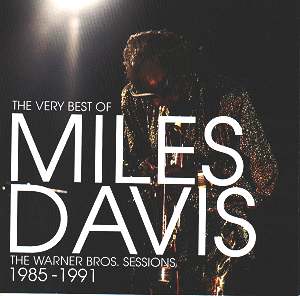1. Tutu
2. Splatch
3. Catembe
4. Mr Pastorius
5. Amandla
6. Mystery
7. Chocolate Chip
8. The Doo-Bop Song
9. Trumpet Cleaning
10. Siesta/Kitt's Kiss/Lost In Madrid, Part
2
11. The Pan Piper
12. Summertime
13. In a Silent Way
14. Time After Time
15. Hannibal
Miles Davis - Trumpet
Marcus Miller – Bass, keyboards, drums, guitar,
bass clarinet, soprano sax (tracks 1-5, 10)
Paulinho da Costa – Percussion (tracks 1, 2)
Adam Holzman – Synthesiser (track 2)
Steve Reid – Percussion (track 2)
Kenny Garrett – Alto sax (tracks 3, 511, 12,
13)
Al Foster – Drums (track 4)
Jason Miles – Synthesiser programming (tracks
4, 10)
Joe Sample – Piano (track 5)
Omar Hakim – Drums (track 5)
Don Alias, Bashiri Johnson – Percussion (track
5)
Easy Mo Bee – Keyboards, vocals (tracks 6-8)
A, B. Money, J. R. – Vocals (track 8)
Deron Johnson – Keyboards (track 8)
The Michel Legrand Orchestra (track 9)
John Scofield – Acoustic guitar (track10)
Omar Hakim – Drums (track 10)
Wallace Roney – Trumpet (tracks 11, 12)
The Gil Evans Orchestra and the George Gruntz
Concert Jazz Band conducted by Quincy Jones
(tracks 11,12)
Foley - Bass (tracks 13-15)
Adam Holzman – Keyboards (tracks 13, 14)
Joey DeFrancesco – Keyboards (track 13)
Benny Rietveld – Bass (tracks 13, 14)
Marilyn Mazur – Percussion (track 13)
Ricky Wellman – Drums (tracks 13-15)
Kei Akagi – Keyboards (track 14)
Munyungo Jackson – Percussion (track 14)
Deron Johnson – Keyboards (track 15)
Richard Patterson – Bass (track 15)
In
the last years of his life, trumpeter Miles
Davis signed with Warner Brothers, so this
CD is a selection from his final recordings.
By this stage, Miles had taken the principle
of "less is more" to the extreme:
playing short phrases over arrangements provided
by the likes of bassist Marcus Miller and
Easy Mo Bee. That economical style worked
well on the recordings that Miles made earlier
with Gil Evans, because Gil provided imaginative
backings that suited Davis perfectly. But
on these later albums the backings are generally
too mechanized: sticking to disco or hip-hop
grooves which are too repetitive to maintain
one’s interest. And Miles’s playing is very
erratic, marred by split notes and poor intonation.
The flaws in Miles’s technique, which were
noticeable back in his bebop days, are very
evident here and often make his solo contributions
sound like mere doodling.
The
most coherent tracks are The Pan Piper
and Summertime, from the session at
Montreux for which Quincy Jones persuaded
Miles to revisit some of his former glories.
Tutu is from the 1986 album which revived
Miles’s career, and it’s certainly a catchy
track - although it hardly stretches the trumpeter,
whose playing is decorative rather than innovative.
The last three tracks come from the posthumous
CD Live Around the World and convey
the excitement of the concert atmosphere,
although Miles’ playing is still fragmentary
and backed by funky accompaniments which tend
to sound samey.
Trumpeter
Wallace Roney, who plays on the two Quincy
Jones tracks, contributed the sleeve-notes
and they are remarkably ambiguous. He calls
Miles "the Master" but he says that
the tracks with Easy Mo Bee "sound like
he is playing along with the radio" and
he criticises the Marcus Miller arrangements
for not using "real instruments".
He also says that he would really have liked
to write the liner notes for an album from
Miles’s classic quintet of the mid-sixties,
suggesting that he’s not so keen on these
latter-day performances. Nor am I.
Tony Augarde
